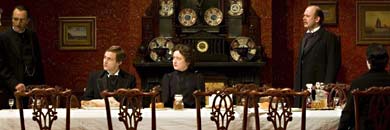Harley Granville-Barker: How he radicalised the British stage
Harley Granville-Barker brought Shakespeare into the 20th century. He scripted some fine, incisive plays too, says Paul Taylor

It would be hard to exaggerate the seminal role played by the actor, director, playwright and polemicist Harley Granville-Barker (1877-1946) in the development of 20th-century British theatre.
We automatically associate the Royal Court Theatre in Sloane Square with George Devine's English Stage Company and the explosive impact of John Osborne's Look Back in Anger. But 50 years earlier, at the same London address and with similar ideals, Barker had launched three revolutionary seasons (1904-07) that fought to create the conditions in which intelligent new drama could flourish, challenging the pernicious system of long runs, lavish settings, and an emphasis on stars that deterred artistic risk.
Almost 1,000 performances were presented, of 32 plays by 17 authors, including Ibsen, Galsworthy, Yeats, Maeterlinck, and, above all, Shaw.
The repertory movement and the National Theatre for which Barker agitated (drawing up the first detailed Scheme for it in 1907, with the critic William Archer) owe a huge amount to his example and inspiration, as does modern Shakespeare production.
In his landmark 1912 stagings of The Winter's Tale and Twelfth Night, Barker used an apron stage, a full text rather than a slashed and bowdlerised one, and non-realistic backdrops, while promoting rapid verse delivery ("Character in action, not sound like the voice beautiful from a lectern...") and fluency of action. Thanks to him, the artistic values that we take for granted in Shakespearean drama were liberated from Victorian literalism.
So, Barker's legacy would have been considerable, had he not also written a clutch of subtle, penetrating plays that combine Chekhovian skill at handling a large ensemble with trenchant social analysis. At the National Theatre, a revival of The Voysey Inheritance (1905) is now in preview, directed by Peter Gill, who wittily both likens the piece to, and distinguishes it from, the work of the Russian master in saying that "it is not about the failure of the aristocracy, it's about the health and resilience of the English upper-middle classes when they are found out up to one of their many tricks."
The dirty trick in question is financial fraud. Young Edward Voysey's inheritance is the discovery that his father's law firm has been swindling its clients. Like a precursor of Robert Maxwell, Voysey senior criminally speculates with their trust funds. He reveals the secret to Edward. Then he dies, leaving his son with the Hamlet-like dilemma of how to remain true to himself while lumbered with his father's agenda. Should he persist in the deception?
Fielding more than a dozen characters, the play is an often mordantly funny attack on complacent middle-class hypocrisy and the entire capitalist system. Business is shown to depend upon a confidence trick: "If one is not opulent in one's daily life, one loses that wonderful financier's touch," the older Voysey tells his appalled heir.
The morality of unearned income is subjected to radical questioning when Alice, Edward's future wife, recalls how her guardian once told her that, "You've no particular right to your money. You've not earned it or deserved it in any way. And don't be surprised or annoyed when any enterprising person tries to get it from you. He has as much right as you have. If he can use it better, perhaps he has more right. Shocking sentiments? But perhaps that's why I've less patience with some of these clients than you have, Edward."
The subversiveness of this notion is reinforced by the fact that the victims are a far from edifying bunch. Rich pillars of the community are anxious to muscle in ahead of the needy in the queue for reparations.
In the masterly middle act, after the father's funeral, Edward intemperately confronts the family with the disgraceful secret and declares that they must renounce their fortune. Max Beerbohm wrote that he was tempted to regard it as "the finest scene of grim, ironic comedy in modern English drama".
The world of Edwardian women, their economic dependence on men and the interaction of fashion and feminism, is viewed in four different environments in his astonishing 1910 piece The Madras House.
The protagonist's father, a convert to Islam, is able to use his adopted cultural perspective to cut through the Western hypocrisies of a male-run garment trade that sees no contradiction in capitalising on the women's movement. But his own double standards are exposed when he defends polygamy as the best alternative to this "industrial seraglio".
In 1918, Barker acquired a wealthy American wife and retired from the hurly burly of the theatre. Strowde, the protagonist of The Secret Life, one of the plays he wrote afterwards, argues that only inner satisfaction can give external achievement meaning. But the piece almost rarefies itself out of existence. Strowde comes across as an abstract alter ego.
The puzzle of what happened psychologically to theatre's great white hope would make a fascinating, speculative drama - though you would probably need the gifts of Granville-Barker to do it justice.
'The Voysey Inheritance', National Theatre Lyttelton, London SE1 (020-7452 3000) to 7 June
Subscribe to Independent Premium to bookmark this article
Want to bookmark your favourite articles and stories to read or reference later? Start your Independent Premium subscription today.

Join our commenting forum
Join thought-provoking conversations, follow other Independent readers and see their replies